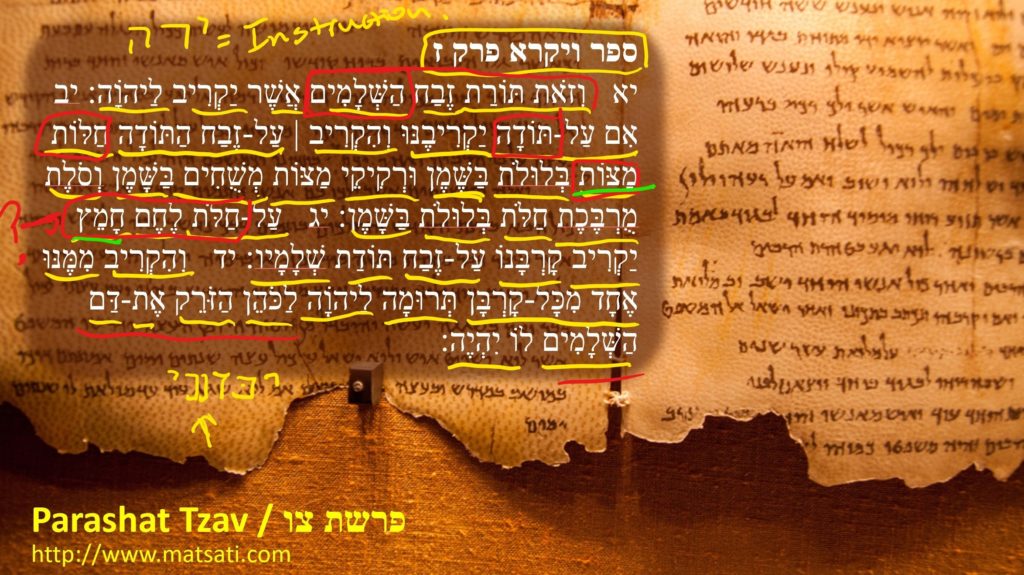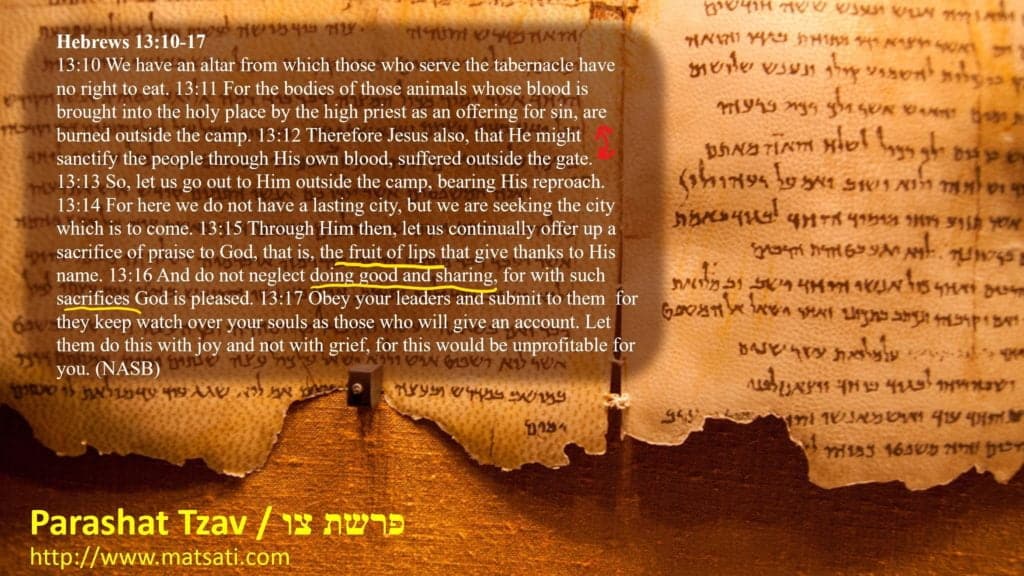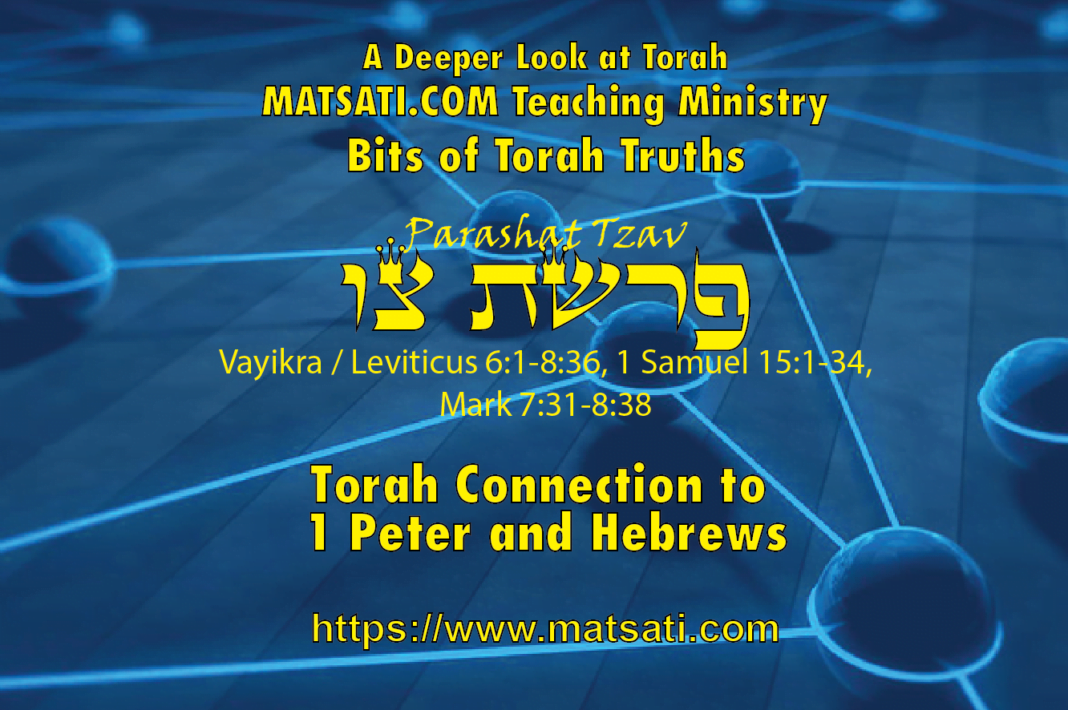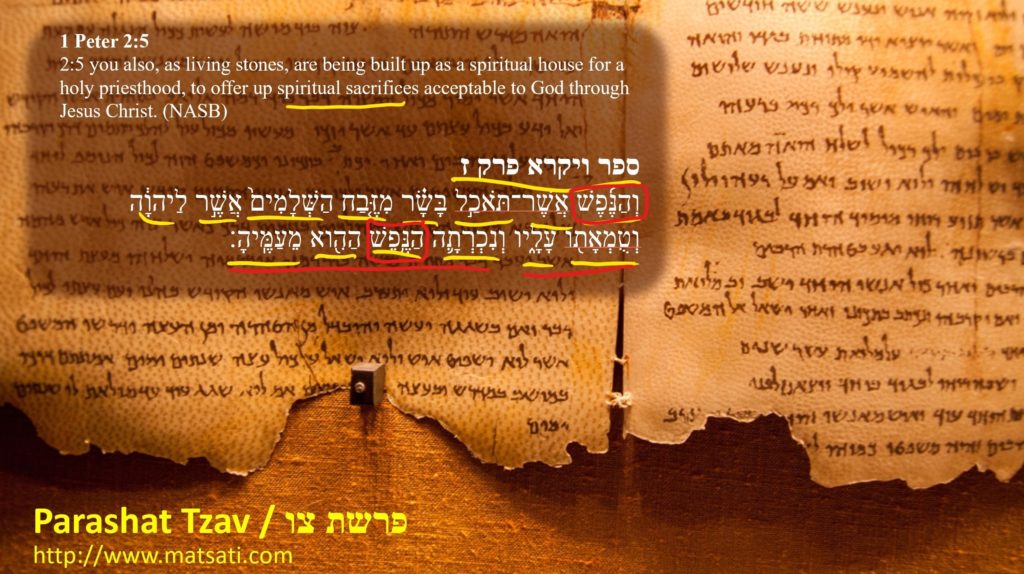This week’s Torah Portion, Parashat Tzav, we read about the Olah Korban (Burnt offering, 6:8-13), the Mincha Korban (Grain offering, 6:14-23), the Khatat Korban (Sin offering, 6:24-30), the Asham Korban (Guilt offering, 7:1-10), the Shelamim Korban (Peace offering, 7:11-21), forbidding eating the fat and the blood (7:22-27), the share for the Cohen (Priest, 7:29-38), and the ordination of Aaron and his sons. (8:1-36) According to Vayikra / Leviticus 7:11-14, we read the following, יא וְזֹאת תּוֹרַת זֶבַח הַשְּׁלָמִים אֲשֶׁר יַקְרִיב לַיהוָֹה: יב אִם עַל-תּוֹדָה יַקְרִיבֶנּוּ וְהִקְרִיב | עַל-זֶבַח הַתּוֹדָה חַלּוֹת מַצּוֹת בְּלוּלֹת בַּשֶּׁמֶן וּרְקִיקֵי מַצּוֹת מְשֻׁחִים בַּשָּׁמֶן וְסֹלֶת מֻרְבֶּכֶת חַלֹּת בְּלוּלֹת בַּשָּׁמֶן: יג עַל-חַלֹּת לֶחֶם חָמֵץ יַקְרִיב קָרְבָּנוֹ עַל-זֶבַח תּוֹדַת שְׁלָמָיו: יד וְהִקְרִיב מִמֶּנּוּ אֶחָד מִכָּל-קָרְבָּן תְּרוּמָה לַיהוָֹה לַכֹּהֵן הַזֹּרֵק אֶת-דַּם הַשְּׁלָמִים לוֹ יִהְיֶה: 7:11 ‘Now this is the law of the sacrifice of peace offerings which shall be presented to the Lord. 7:12 ‘If he offers it by way of thanksgiving, then along with the sacrifice of thanksgiving he shall offer unleavened cakes mixed with oil, and unleavened wafers spread with oil, and cakes of well stirred fine flour mixed with oil. 7:13 ‘With the sacrifice of his peace offerings for thanksgiving, he shall present his offering with cakes of leavened bread. 7:14 ‘Of this he shall present one of every offering as a contribution to the Lord; it shall belong to the priest who sprinkles the blood of the peace offerings. (NASB) The biblical text states, וְזֹאת תּוֹרַת זֶבַח הַשְּׁלָמִים why is this the instruction (תּוֹרַת) of the offering called זֶבַח הַשְּׁלָמִים “the peace offering?” The rabbis say this was meant to restore peace between God our Father in heaven and the people. In addition, we are told about the תּוֹדָה “thank” offering. The Psalmist describes this according to Tehillim / Psalms 50:23.

ספר תהילים פרק נ
כג זֹבֵחַ תּוֹדָה יְכַבְּדָנְנִי וְשָֹם דֶּרֶךְ אַרְאֶנּוּ בְּיֵשַׁע אֱלֹהִים:
Tehillim / Psalms 50:23
50:23 ‘He who offers a sacrifice of thanksgiving honors Me; And to him who orders his way aright I shall show the salvation of God.’ (NASB)
The Psalms states זֹבֵחַ תּוֹדָה יְכַבְּדָנְנִי “sacrifice of thanks, honors me.” Here we see how the one who honors the Lord does not just bring a thank offering, but also the one who orders his ways according to God’s Word the Lord will show the salvation of God. It is very interesting how this is coupled to the Shelamim Korban (זֶבַח הַשְּׁלָמִים), the way of God, salvation, and bringing glory to God in thankfulness. We also note the spelling of the word יְכַבְּדָנְנִי as having two nun’s (נ) the rabbis say the reason for the doubling is that God will feel honoured both in olam hazeh (this world) and the olam haba (the world to come). These things speak to our act of worship through the sacrifice of our lives, just as Paul wrote according to Romans 12, we are able to honor God in all worlds (on Earth and in the spiritual or heavenly regions). (Daat Zkenim on Vayikra / Leviticus 7.11 Part 1)
We note something here on Vayikra / Leviticus 7:11-12, יא וְזֹאת תּוֹרַת זֶבַח הַשְּׁלָמִים אֲשֶׁר יַקְרִיב לַיהוָֹה: יב אִם עַל-תּוֹדָה יַקְרִיבֶנּוּ וְהִקְרִיב | עַל-זֶבַח הַתּוֹדָה חַלּוֹת מַצּוֹת בְּלוּלֹת בַּשֶּׁמֶן וּרְקִיקֵי מַצּוֹת מְשֻׁחִים בַּשָּׁמֶן וְסֹלֶת מֻרְבֶּכֶת חַלֹּת בְּלוּלֹת בַּשָּׁמֶן: 7:11 ‘Now this is the law of the sacrifice of peace offerings which shall be presented to the Lord. 7:12 ‘If he offers it by way of thanksgiving, then along with the sacrifice of thanksgiving he shall offer unleavened cakes mixed with oil, and unleavened wafers spread with oil, and cakes of well stirred fine flour mixed with oil. (NASB) There were two types of Shelamim (Peace) offerings, one called תודה and the other which is referred to as שלמים. (Rabbeinu Bahya, Vayikra / Leviticus 7.11 Part 1) What is interesting is how the Todah (תודה) offering was accompanied by both unleavened and leavened bread. This is stated explicitly in verse 13, יג עַל-חַלֹּת לֶחֶם חָמֵץ יַקְרִיב קָרְבָּנוֹ עַל-זֶבַח תּוֹדַת שְׁלָמָיו: 7:13 ‘With the sacrifice of his peace offerings for thanksgiving, he shall present his offering with cakes of leavened bread. (NASB) What do these things teach us? I feel this speaks to our offering of thanks in this life is to be done in both the sacred space (at synagogue, our homes, our private lives, etc) and while we are out in the world by the mention of unleavened and leavened bread, respectively. The offering called שלמים with or without the word תודה, or whether one is making a free will offering called either נְדָבָה (charity) or נדר (vow), depending on the wording of one’s vow to the giving (or donation) of such an offering. In addition, something to note, the Torah states elsewhere (Vayikra / Leviticus 2:11) saying, “no manner of leavened material or honey is to be offered up on the Altar.” This tells us that these loaves of the תודה offering were not put on the Altar at all. Hence there is no contradiction here to what the Torah wrote in Vayikra / Leviticus 2:11. The loaves were only “waved” before the Lord and not deposited or burned up on the Altar.
The verses we are looking at for this week are from Vayikra / Leviticus 7:11-21.
ספר ויקרא פרק ז
יא וְזֹאת תּוֹרַת זֶבַח הַשְּׁלָמִים אֲשֶׁר יַקְרִיב לַיהוָֹה: יב אִם עַל-תּוֹדָה יַקְרִיבֶנּוּ וְהִקְרִיב | עַל-זֶבַח הַתּוֹדָה חַלּוֹת מַצּוֹת בְּלוּלֹת בַּשֶּׁמֶן וּרְקִיקֵי מַצּוֹת מְשֻׁחִים בַּשָּׁמֶן וְסֹלֶת מֻרְבֶּכֶת חַלֹּת בְּלוּלֹת בַּשָּׁמֶן: יג עַל-חַלֹּת לֶחֶם חָמֵץ יַקְרִיב קָרְבָּנוֹ עַל-זֶבַח תּוֹדַת שְׁלָמָיו: יד וְהִקְרִיב מִמֶּנּוּ אֶחָד מִכָּל-קָרְבָּן תְּרוּמָה לַיהוָֹה לַכֹּהֵן הַזֹּרֵק אֶת-דַּם הַשְּׁלָמִים לוֹ יִהְיֶה: טו וּבְשַֹר זֶבַח תּוֹדַת שְׁלָמָיו בְּיוֹם קָרְבָּנוֹ יֵאָכֵל לֹא-יַנִּיחַ מִמֶּנּוּ עַד-בֹּקֶר: טז וְאִם-נֶדֶר | אוֹ נְדָבָה זֶבַח קָרְבָּנוֹ בְּיוֹם הַקְרִיבוֹ אֶת-זִבְחוֹ יֵאָכֵל וּמִמָּחֳרָת וְהַנּוֹתָר מִמֶּנּוּ יֵאָכֵל: יז וְהַנּוֹתָר מִבְּשַֹר הַזָּבַח בַּיּוֹם הַשְּׁלִישִׁי בָּאֵשׁ יִשָּׂרֵף: יח וְאִם הֵאָכֹל יֵאָכֵל מִבְּשַֹר-זֶבַח שְׁלָמָיו בַּיּוֹם הַשְּׁלִישִׁי לֹא יֵרָצֶה הַמַּקְרִיב אֹתוֹ לֹא יֵחָשֵׁב לוֹ פִּגּוּל יִהְיֶה וְהַנֶּפֶשׁ הָאֹכֶלֶת מִמֶּנּוּ עֲוֹנָהּ תִּשָּׂא: יט וְהַבָּשָֹר אֲשֶׁר-יִגַּע בְּכָל-טָמֵא לֹא יֵאָכֵל בָּאֵשׁ יִשָּׂרֵף וְהַבָּשָֹר כָּל-טָהוֹר יֹאכַל בָּשָֹר: כ וְהַנֶּפֶשׁ אֲשֶׁר-תֹּאכַל בָּשָֹר מִזֶּבַח הַשְּׁלָמִים אֲשֶׁר לַיהוָֹה וְטֻמְאָתוֹ עָלָיו וְנִכְרְתָה הַנֶּפֶשׁ הַהִוא מֵעַמֶּיהָ: כא וְנֶפֶשׁ כִּי-תִגַּע בְּכָל-טָמֵא בְּטֻמְאַת אָדָם אוֹ | בִּבְהֵמָה טְמֵאָה אוֹ בְּכָל-שֶׁקֶץ טָמֵא וְאָכַל מִבְּשַֹר-זֶבַח הַשְּׁלָמִים אֲשֶׁר לַיהוָֹה וְנִכְרְתָה הַנֶּפֶשׁ הַהִוא מֵעַמֶּיהָ:
Vayikra / Leviticus 7:11-21
7:11 ‘Now this is the law of the sacrifice of peace offerings which shall be presented to the Lord. 7:12 ‘If he offers it by way of thanksgiving, then along with the sacrifice of thanksgiving he shall offer unleavened cakes mixed with oil, and unleavened wafers spread with oil, and cakes of well stirred fine flour mixed with oil. 7:13 ‘With the sacrifice of his peace offerings for thanksgiving, he shall present his offering with cakes of leavened bread. 7:14 ‘Of this he shall present one of every offering as a contribution to the Lord; it shall belong to the priest who sprinkles the blood of the peace offerings. 7:15 ‘Now as for the flesh of the sacrifice of his thanksgiving peace offerings, it shall be eaten on the day of his offering; he shall not leave any of it over until morning. 7:16 ‘But if the sacrifice of his offering is a votive or a freewill offering, it shall be eaten on the day that he offers his sacrifice, and on the next day what is left of it may be eaten; 7:17 but what is left over from the flesh of the sacrifice on the third day shall be burned with fire. 7:18 ‘So if any of the flesh of the sacrifice of his peace offerings should ever be eaten on the third day, he who offers it will not be accepted, and it will not be reckoned to his benefit. It shall be an offensive thing, and the person who eats of it will bear his own iniquity. 7:19 ‘Also the flesh that touches anything unclean shall not be eaten; it shall be burned with fire. As for other flesh, anyone who is clean may eat such flesh. 7:20 ‘But the person who eats the flesh of the sacrifice of peace offerings which belong to the Lord, in his uncleanness, that person shall be cut off from his people. 7:21 ‘When anyone touches anything unclean, whether human uncleanness, or an unclean animal, or any unclean detestable thing, and eats of the flesh of the sacrifice of peace offerings which belong to the Lord, that person shall be cut off from his people.’‘ (NASB)
What we have learned so far, there are offerings in the Torah, specifically those called זֶבַח הַשְּׁלָמִים “the peace offering” categorizes different types of offerings. For instance, if the שְּׁלָמִים involved thanksgiving, the animal sacrifice are accompanied by breads, some of which are unleavened, and some of which are leavened. The rabbis say that the reason for the need of varying types of bread is do to what the sages call שְׁאוֹר שבעיסה(Sheor Shebeyisa) “the element of ego in the dough” by reason being pride also needed to be given up. The gemarah in the Talmud Bavli ברכות / Brachot 17a, tells us that a righteous rabbi during the time of the Talmud would add a prayer at the conclusion of his shemona esrey amidah. The rabbi would say the following “Master of the universe, it is known and revealed before you that our will is to do your will. What holds us back is only ‘Sheor Shebeyisa – שאור שבעיסה’” the element of ego in the dough, or pride. Rashi comments on this gemarah saying that Sheor Shebeyisa is a reference to the יצר הרע yetzer harah, the evil inclination that incites a person to sin. We note this connection to the bread, as no other offering consisted of leavened bread. The rabbis also say “One of the reasons the Torah requires so many individual loaves of bread as part of the Todah sacrifice, is to enable as many people as possible to become aware of someone having been miraculously saved.” This concept of salvation comes from what is related to the thank offering, as the one who does not know the Lord, or does not care about God and His great works would not give thanks, and the one who does know the Lord and His powerful works in our lives and therefore would give thanks. Both the Author of the book of Hebrews and Peter wrote about this saying:

Hebrews 13:10-17
13:10 We have an altar from which those who serve the tabernacle have no right to eat. 13:11 For the bodies of those animals whose blood is brought into the holy place by the high priest as an offering for sin, are burned outside the camp. 13:12 Therefore Jesus also, that He might sanctify the people through His own blood, suffered outside the gate. 13:13 So, let us go out to Him outside the camp, bearing His reproach. 13:14 For here we do not have a lasting city, but we are seeking the city which is to come. 13:15 Through Him then, let us continually offer up a sacrifice of praise to God, that is, the fruit of lips that give thanks to His name. 13:16 And do not neglect doing good and sharing, for with such sacrifices God is pleased. 13:17 Obey your leaders and submit to them for they keep watch over your souls as those who will give an account. Let them do this with joy and not with grief, for this would be unprofitable for you. (NASB)
1 Peter 2:5
you also, like living stones, are being built into a spiritual house to be a holy priesthood, offering spiritual sacrifices acceptable to God through Jesus Christ. (NASB)
Here the author of the book of Hebrews tells us to always be giving the sacrifice of praise to God in the Messiah connecting the Messiah to these sacrifices. (לָכֵן בְּכָל עֵת נַקְרִיבָה בְּתִוּוּכוֹ זֶבַח תּוֹדָה לֵאלֹהִים, כְּלוֹמַר, פְּרִי שְׂפָתַיִם הַמּוֹדוֹת לִשְׁמוֹ, 13:15) In addition, Peter states that we are to at all times offer spiritual sacrifices (זִבְחֵי רוּחַ) as being specially sanctified and set apart as a holy priesthood (לִכְהֻנַּת קֹדֶשׁ), meaning this is the way we should be living our lives because of what God has done for us through the Messiah Yeshua.
The Torah Portion continues saying the following according to Vayikra / Leviticus 7:20.
ספר ויקרא פרק ז
וְהַנֶּ֜פֶשׁ אֲשֶׁר־תֹּאכַ֣ל בָּשָׂ֗ר מִזֶּ֤בַח הַשְּׁלָמִים֙ אֲשֶׁ֣ר לַיהוָ֔ה וְטֻמְאָת֖וֹ עָלָ֑יו וְנִכְרְתָ֛ה הַנֶּ֥פֶשׁ הַהִ֖וא מֵעַמֶּֽיהָ׃
Vayikra / Leviticus 7:20
But the person who, in a state of uncleanness, eats flesh from the LORD’s sacrifices of well-being, that person shall be cut off from his kin.
Here the text states וְנִכְרְתָ֛ה הַנֶּ֥פֶשׁ הַהִ֖וא מֵעַמֶּֽיהָwhich is the Torah decree of one being karet (cut off) from the people (Bereshit / Genesis 17:14, Shemot / Exodus 12:15, 30:33, 31:14, Bamidbar / Numbers 9:13, Numbers 9:13, 15:30-31, 18:3, Vayikra / Leviticus 17:10, 17:14, 7:18, 7:20-21, 7:25, 19:8, 23:29-30, 24:15, 24:27) There are many locations for this decree and many reasons for this type of uncleanness, we note examples of not circumcising your children, failing to observe sacred time, such as the Passover, shabbat, Yom Kippur, of what we eat such as drinking blood, misuse of the incense from the tabernacle, blaspheming or sinning in defiance, incestuous marriages, rape, and idol worship. We also note that this did not always mean one was to be put to death but that one was not to be included in the community (i.e. excommunicated). We note here in Vayikra / Leviticus 7:20 we read וְטֻמְאָת֖וֹ עָלָ֑יו “while he was still ritually unclean.” if we consider those things that cause one to be karet from the people, these things speak to being unrepentant or disregarding God’s Word. Here in the Shalamim korban, the warning was to not eat the sacrificial meat unless one is ritually pure. We also note the idea of not leaving the meat for the third day, meaning one may eat the meat the first day, the second day, but on the third day one must burn the meat up and not eat it. The underlying reason is not specifically given to us in the Torah for why not to eat on the third day, but that one must destroy what is left over and not eat. It may be that the meat would become corrupted on the third day and not be fit for consumption. When thinking about the third day motif in throughout the Scriptures, naturally this makes us think about Yeshua who raised from the grave on the third day. Coupled with the book of Hebrews connecting the sacrifice of praise to God in the Messiah as making peace in our lives before God through faith. All of these things draw us back to consider what it means to have faith and believe in God’s Word, obeying His Word, and listening to God’s Word.
Now if we consider what the text is saying specifically about the idea of the thank offering having both leavened and unleavened bread we note the intent or the purpose of the metaphor of שְׁאוֹר שבעיסה(Sheor Shebeyisa) as relating to chametz (leaven or yeast) in a lump of sourdough. When yeast is placed inside of dough, the dough raises causing the bread to be larger, as if it has a larger quantity. However, the truth be told, from an engineering perspective, a mass balance on the bread shows the actual quantity of dough has not changed, only its volume has changed, and in fact its mass remained the same. What the yeast does is it exaggerates the appearance of how much dough is really there. This is what happens with pride enters into our lives. This is also what happens with the yetzer hara (evil inclination) and what this does in our lives convincing us to sin. In fact, the yetzer hara also exaggerates the difficulty involved in obeying God’s Word. (Remember what is taught about the yetzer hara, that it was given from God as being the motivation for our building a business, to getting married, to having or being involved in competition, note how these things are not inherently sinful and the Lord creating us with the yetzer hara is not contradictory in terms of who God is as holy, righteous, just, and loving.)
These are the things that we are being taught from the Shalamim (שְּׁלָמִים) and the Todah (תודה) offerings by allowing both unleavened and leavened bread, Vayikra / Leviticus 7:13, יג עַל-חַלֹּת לֶחֶם חָמֵץ יַקְרִיב קָרְבָּנוֹ עַל-זֶבַח תּוֹדַת שְׁלָמָיו: 7:13 ‘With the sacrifice of his peace offerings for thanksgiving, he shall present his offering with cakes of leavened bread. (NASB) These things speak to our offering thanks in this life is to be done in both the sacred space which includes our private life and while we are out in the world by the mention of unleavened and leavened bread, respectively. These things also reminds us of what Yeshua said according to Mark 7, that what comes from within defiles a man, and the significance of these things in relation to the sacrifice of praise, or seeking atonement in the blood of Yeshua. Remember last week we discussed how there is no sacrifice for intentional sins (see Vayikra / Leviticus 1-4, Hebrews 10). Now we note for the Passover we are supposed to destroy the chametz in our homes. The rabbis say this was meant to inspire us to uproot our yetzer hara. Now this is not the most significant point of removing the chametz from our homes, rather, while a person is searching for and destroying his chametz, he must simultaneously be involved in the process of introspection and repentance before God. All of these things speak to who we are in the Messiah and are consistent with both the Torah and the Rabbinic commentaries as the author of Hebrews say, 13:15 Through Him then, let us continually offer up a sacrifice of praise to God, that is, the fruit of lips that give thanks to His name. (NASB)










